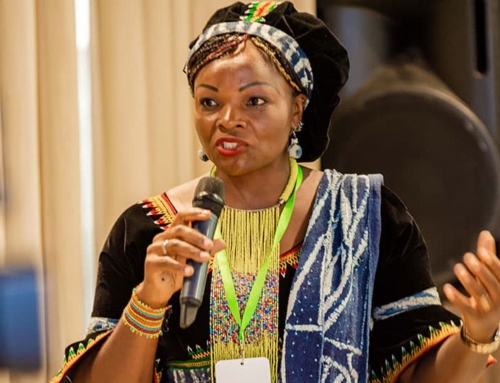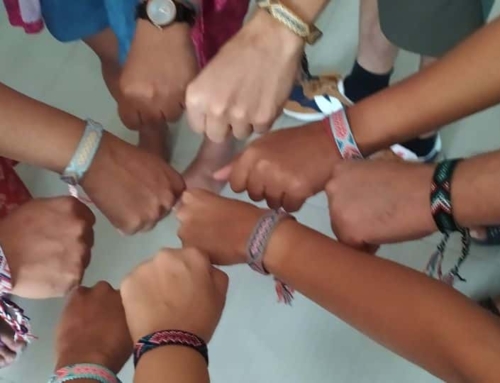CFLEDD (Coalition of Women Leaders for the Environment and Sustainable Development) is a growing movement of women in the Democratic Republic of the Congo (DRC) advocating for women’s land rights and sustainable development. We spoke to Néné Mainzana, the President of CFLEDD, who explained why now is a critical moment to advance land rights for rural communities – and for women in particular – in the DRC.
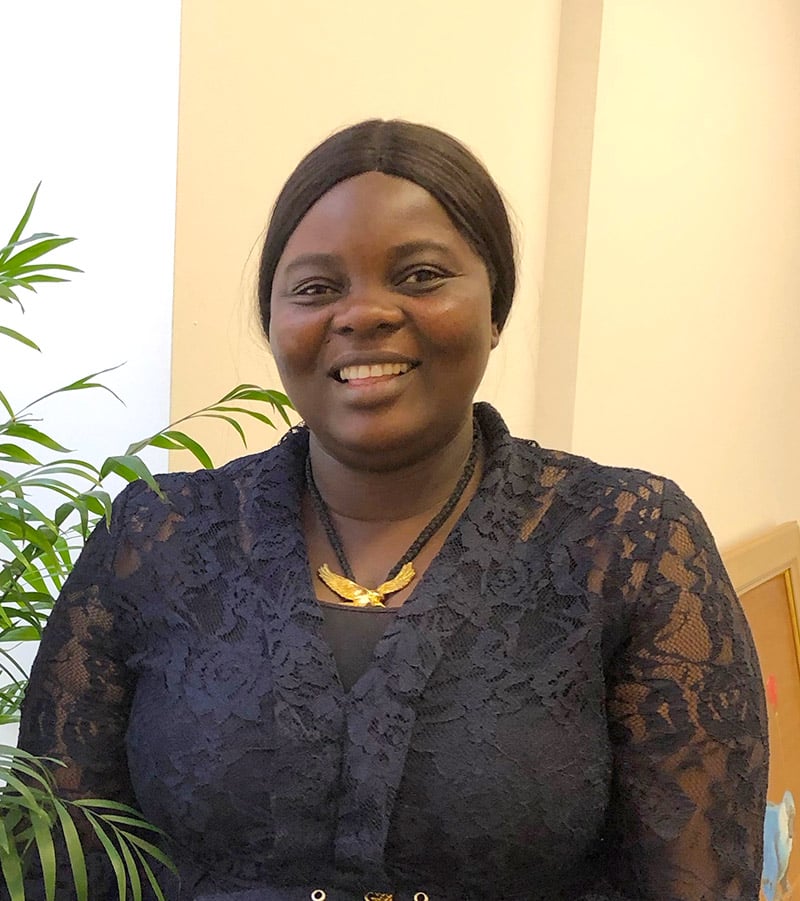
Years later, on returning to the same place, the forest she remembered was no longer there, the rural communities long gone. Large-scale logging had devastated the landscape, forcing the inhabitants of the village to relocate, leaving them with nothing.
In her career as a journalist, land rights and the impact of unsustainable development on rural communities and biodiversity have been recurring themes. Frustrated by the lack of transparency and information available from government sources, Néné got involved with civil society groups advocating for land rights for rural and indigenous peoples. As she developed her understanding of the issues and got more involved, it was clear that key voices were not being heard:
“If you go to any of the villages, it’s the women who go into the forests, every day. The forest is their supermarket, their pharmacy – it provides for all their needs. If there’s anyone who should benefit from help, it’s the women who are in the fields every day, 365 days a year and who do 80 or 90 per cent of the work. Women should have a say in how the land is managed, along with the men.”
A growing movement of women, leading the fight for land rights
This is where the Coalition of Women Leaders for the Environment and Sustainable Development (CFLEDD) comes in. What started as a project involving just four women is now a coalition which counts over 300 organisations and individuals among its membership.
In all its research and discussions, CFLEDD comes up against the same problem: regardless of the type of social system, whether they are talking to indigenous peoples or local communities, the women who know the land and the forest best have no say. They are excluded from discussions on how to manage land, and this is having a profoundly negative impact on communities and on biodiversity. Whilst other groups have tackled issues around land rights for indigenous communities, promoted sustainable development and advocated for greater environmental protection, there was no group specifically addressing these issues from the perspective of women’s land rights.
“We work with women leaders, regardless of whether they have studied or have any formal qualifications.” says Néné. “If a woman knows the village, if she has indigenous or local knowledge, we consider her to be a leader, and she can be part of our work. It’s just a question of sharing an ideology and having the same way of seeing things.”
A forgotten forest
The Democratic Republic of the Congo (DRC) covers an area roughly the size of Western Europe. The Congo Basin rainforest, 60 per cent of which lies within the DRC – is of global importance – second only in size to the Amazon, but it receives much less international attention.
In a push to exploit its mineral and agricultural wealth, successive governments have handed over an increasing amount of land to extractive and agricultural industries. Logging, mining, oil exploration and, perhaps surprisingly, conservation have all contributed to marginalising rural communities and threatening the forests which sustain them. Although large areas of forest are still intact, particularly in the DRC, the push for development leaves this entire region extremely vulnerable. Between 2000 – 2014, the rate of forest loss in the Congo Basin doubled, with an area the size of Ireland being destroyed over that period. (IUCN CEESP, Land Rights and Nature Conservation in the DRC)
A coalition led by women for women
CFLEDD is a coalition led by women for women. With its broad membership base, it is also deeply connected to other civil society movements. Among the membership, there is a wealth and diversity of experience and knowledge:
What makes the work of CFLEDD unique is that it is developing the tools to build women’s land tenure rights into documentation from the start, to guarantee women the same land rights as men. Its aim is to ensure that women’s rights, just like indigenous peoples’ rights, are explicitly addressed in new laws and decrees related to land tenure and that people are made aware of these rights, however remote their community.
“Our role is to help members of the community, particularly women, to air their grievances and claim their rights through the correct channels. This has led to a decree on forest rights. Communities need to know their rights.”
Overcoming obstacles
The absence of a clear legal framework governing land rights has made it easier for large agricultural, timber and mining corporations to gain access to land. Customary land tenure – where the land is owned and maintained by rural and indigenous communities who have traditionally managed it – often has no formal legal basis, so rural communities, both local and indigenous, can find themselves excluded, regardless of how well they know the land and how long they have lived there. To compound this problem, a wide variety of languages and high levels of illiteracy in rural areas means that many people, particularly in the most remote communities, are unaware of any rights they do have, or are unable to understand the legal processes and documentation required to secure them. In this context, CFLEDD has had to overcome numerous obstacles to ensure that women get a place at the table for discussions about land rights. And, Néné says, its work was not universally welcomed.
“We started out very small, with very little funding, but even so we met resistance from some people, who said things like ‘Don’t listen to those women. They’re not capable of doing big projects like that. Don’t give money to those women – they don’t know how to manage it’ and so on.”
Despite these struggles, she is proud that the coalition has now become the go to organisation for women’s rights in environmental and sustainable development circles in the DRC.
“Anybody who needs information or wants to be involved in questions of women’s rights now comes to us. There was a gap for an organisation that could fight for the rights of women within the context of the environment and natural resources, because women simply haven’t had a place at the table. We are now filling that gap.”
Néné’s journalistic experience and networks have been instrumental in developing an effective communications strategy for the organisation, helping its message reach a broader audience and forcing provincial and national authorities to take its work seriously.
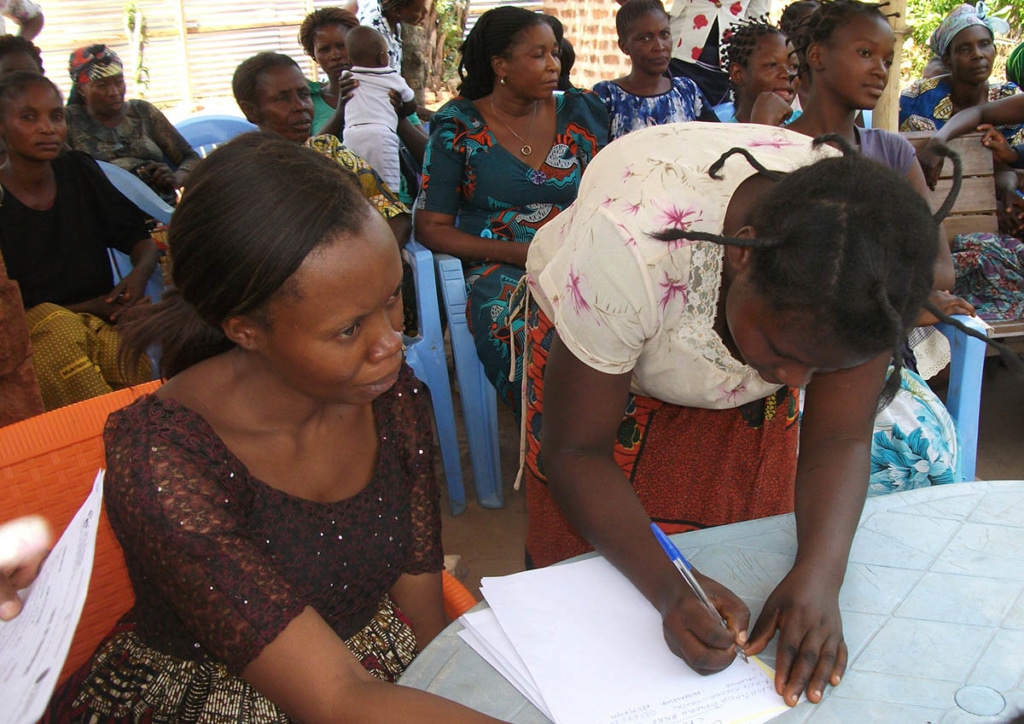
Spreading the message on women’s land rights in Kasai Oriental province, DRC. Image © CFLEDD
Community-managed forests
For Néné, the best way to protect the interests of rural communities and conserve biodiversity is to ensure that communities have the right to manage the land in the same way as they have always done:
“It’s simply the traditional way of managing the land – it’s really a simple usage plan. When we visit a village, they show us how they use the land: ‘here is where we grow our crops, here are the sacred sites, this is our river and water source, here is where we cut wood’. Our role involves helping them to make maps of their land use and officially record it. Land uses are defined and made official through the mapping process.”
What makes its approach stand out, however, is the involvement of women from the very beginning of the process. With the input of rural and indigenous women to mapping land use in communities, and their participation in dialogues about how to manage their land, CFLEDD can start to build women’s rights into a legal framework. Up to now, nothing has been put down on paper, so this documentation can bring recognition and protection, helping to protect communities from future land grabs and guaranteeing their right to use the land in a traditional and sustainable way.
From small seeds…
Synchronicity Earth has recently supported CFLEDD’s work in the province of Kasaï Oriental. Their presence in this province is vital, since there are very few other organisations willing to work there. It has vast mineral wealth – with huge deposits of diamonds – but it is a difficult and challenging environment to work in.
Initially, CFLEDD sent a team there to hold discussions with provincial politicians, lawmakers and members of civil society.
“The idea was to identify the rights women have and who owns the land in this region in Kasaï so we could start to develop community forestry projects to allow women to have multiple usage spaces to cultivate crops and practice conservation.”
CFLEDD was inspired by the willingness of local communities to take part in these discussions and the fact that – knowing the work that had been done elsewhere – these communities were very keen for CFLEDD to come to their province.
In Kasaï Oriental, CFLEDD’s goal was to identify the rights women currently have, find out who owned the land and how that land was used. The first stage of any land rights discussion is to engage in dialogue with village chiefs to pave the way for further discussions with men and women in the community. To Néné’s surprise, after staff had held consultations with members of the community in Mbuji Mayi, four traditional village chiefs immediately agreed to make 500 hectares available to be managed exclusively by women. This was an extraordinary and unexpected result, and testimony to the power of dialogue in bringing about change.
“It was a fantastic moment when I saw the document the provincial coordinator sent back to me, where the local traditional chiefs of four villages had officially signed over 500 hectares of land to be managed as community forests in the province – I was really moved to see that. We’d never seen anything like it, where the traditional land authorities have signed over such a piece of land to be run by women. It was an incredible success for the project.”
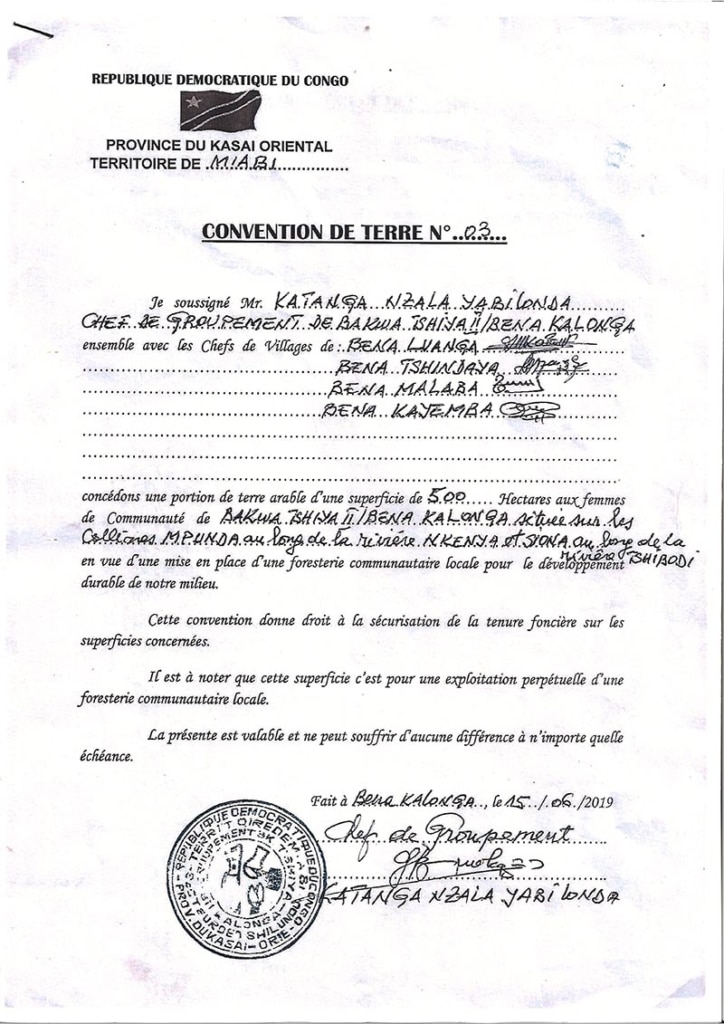
An emotional moment for Néné and CFLEDD: Four village chiefs signed a document granting a group of women in Kasaï Oriental 500 hectares of land to practice community forestry
A key moment for land rights
Now is a key moment for land reform in the DRC. With government consulting civil society about land reform and apparently willing to listen to the concerns of rural and indigenous communities, the work CFLEDD is doing is helping to ensure that women get heard is crucial. Through its hard work and dedication, CFLEDD is putting the interests of women front and centre in the dialogue around land rights.
“Our end goal is to make sure that everything we’re saying about women’s rights becomes part of official state documentation. Land rights reform doesn’t happen overnight. In other countries, it has taken decades or even more. For us now, this is the first opportunity since the colonial era to guarantee the rights of women at a constitutional level. The more we are able to carry out consultations in all the relevant provinces, the better placed we’ll be to contribute to this process.”
Synchronicity Earth is proud to be able to help them do that.
Conservation and community rights are two sides of the same coin, and women need to be at the heart of discussions on land rights and land use. CFLEDD is taking huge strides towards this goal, and deserves all the support it can get to protect Earth’s second largest rainforest, and the people, flora and fauna that make it unique.


